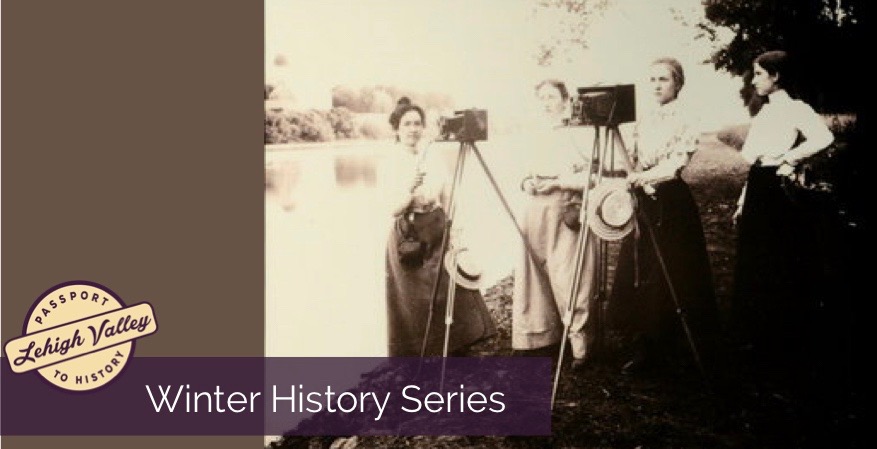Gather round the fire with Lehigh Valley Passport to History partners’ winter program series. We’ll be sharing tales of Valley history that will transport you back in time from the comfort of your living room.
This virtual series, hosted by Lehigh Valley with Love Media’s George Wacker, will air live on second Thursdays at 6:00 p.m. on the Lehigh Valley Passport to History Facebook page. Each 30-minute episode will highlight a different theme and discussion from the night’s host museums.
March’s Theme: Women’s History
Celebrate Women’s History Month with local tales of women’s wisdom, wit, creativity, and innovation. Participating partners include National Museum of Industrial History, Moravian Historical Society, and Boyertown Museum of Historic Vehicles.
Moravian Historical Society speaker: Victoria Starbuck, Collections Assistant and Education Coordinator
Starbuck will discuss some extraordinary Moravian women and how they influenced education in the 1700s. Did you know that colonial Moravian women experienced economic, spiritual, and intellectual freedom that few, if any, of their contemporaries enjoyed? During the 1700s, few women had access to education and those that did were white, wealthy, and educated in “feminine arts” such as needlework and cooking. From the start, the Moravians who founded Nazareth and Bethlehem expected women in their communities to receive formal education that was comparable to their male peers, often leading to the emergence of women leaders in Moravian communities.
Boyertown Museum of Historic Vehicles speaker: Kendra Cook, Curator and Manager
Cook will explore how the bicycle impacted women’s lives in the 1800s. “I think [the bicycle] has done more to emancipate women than any one thing in the world,” wrote Susan B. Anthony in 1896. The invention of the safety bicycle in the 1880s, meaning a bicycle with two wheels of the same size and utilizing chain drive, was looked down upon by men. But to women, especially those of middle and lower class, it was seen as freedom. Much more affordable than the carriages and horses at the disposal of women of means, the bicycle allowed working class women to leave their homes more freely. It allowed them greater footholds in the workforce, in social circles, and political movements. It even led to the loosening of Victorian standards of dress. Part of the Boyertown Museum of Historic Vehicles’ collection is a ca. 1890 women’s model bicycle built by the Acme Manufacturing Company of Reading, Pa.
National Museum of Industrial History speaker: Andria Zaia, Curator of Collections
Zaia will explain how women in the early 1900s helped shape our modern workday. Do you ever wonder about the origins of the five-day work week, minimum wage, and safety protocols at work? Explore how a diverse community of textile workers, comprised mostly of teenage girls, challenged assumptions, fought for workers’ rights, and brought about real change within the American Labor Movement. The role of women in the Bread and Roses Strike of 1912 proved that unity in diversity was possible and that the disenfranchised would be heard.
